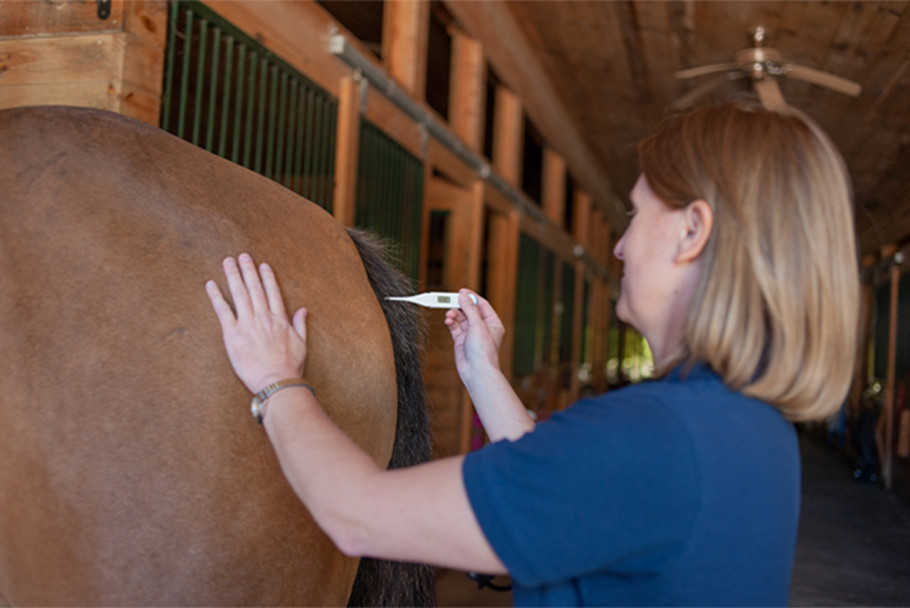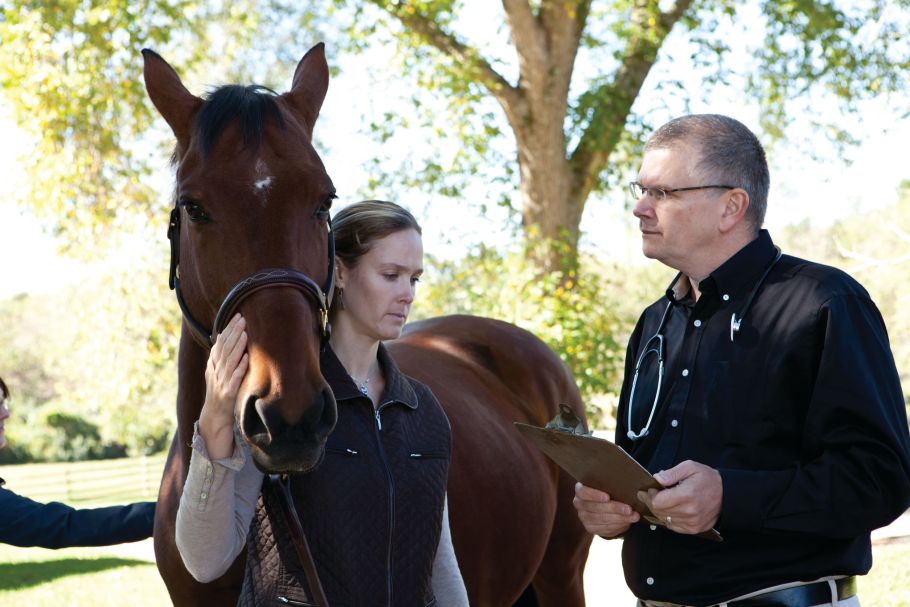What to Do if Your Horse is Colicking
Updated March 29, 2024 | By: Andris J. Kaneps, DVM, PhD, DACVS, DACVSR

Colic, or abdominal pain in in the horse, can range from a short-lived, mild abdominal pain that often goes unnoticed, to severe, unrelenting discomfort that may or may not be correctable even with surgery. Knowing what to do if your horse is colicking, what NOT to do, and what to expect if and when your veterinarian comes out are important skills for all horse owners to have.
Video on What to do if Your Horse is Colicking
What You SHOULD do if Your Horse has Colic
If you see signs of colic in your horse, remove all food, put your horse in a safe area, and evaluate whatever vital signs you safely can. As soon as you can, call your veterinarian and be prepared to explain the situation. Information that will be especially helpful to your veterinarian in determining if your horse needs to be seen and in instructing you what to do in the meantime includes:
- Specific signs of colic and their severity
- Pulse or heart rate (beats per minute)
- Respiratory rate (breaths per minute)
- Rectal temperature
- Color of the gums (white, pale pink, dark pink, red, or bluish-purple)
- Moistness of the gums (moist, tacky, or dry)
- Capillary refill time (how many seconds until color returns following firm pressure on the gums)
- Digestive sounds (regular gurgles about 3 per minute, none audible, rapid gassy sounds)
- Manure production, including color, consistency, and frequency
- Any recent changes in management, feeding, or exercise
- Condition of the stall (bedding torn up due to rolling or hyperactivity, undisturbed bedding)
- Medical history, including deworming and any past episodes of colic
- Breeding history and pregnancy status
- Insurance status of the horse
For a breakdown of what colic means, causes, types and diagnostics, read this article on equine colic and digestive health. Another valuable resource is the AAEP’s Guidelines to Follow During Equine Emergencies to help horse owners recognize when a problem is serious, respond promptly, and take the appropriate actions.
What You Should NOT do if Your Horse is Colicking
If your horse has colic, you do not need to walk your horse constantly or keep him standing. Horses will not twist their intestines by rolling. Some hand walking or calmly resting until the veterinarian arrives is all that is needed.
Also, don’t administer anything by mouth or by injection UNLESS YOUR VETERINARIAN SPECIFICALLY INSTRUCTS YOU TO DO SO. Some medications mask signs, potentially making your horse look temporarily more comfortable. This may complicate the treatment decisions your veterinarian must make during the examination.
What to Expect When the Veterinarian Comes for Colic

Depending on how painful your horse is, your veterinarian may get right to work treating him or start by reviewing some facts with you. Be prepared to provide an accurate history (including your horse’s feeding program, usual exercise and turnout routine, deworming and vaccination programs, and any recent travel or other changes). Also, describe your recent observations of him.
Treatment for Colic in Horses at Home
Usually at that time, your veterinarian will perform a physical examination, which may include a rectal palpation, passing a nasogastric (stomach) tube, sampling of abdominal fluid for analysis (“belly tap”), drawing blood, and other tests.
Based on this examination, your veterinarian may start medical treatment at home or refer your horse to a veterinary hospital for medical treatment or colic surgery. Medical treatment may include drugs to relieve pain, sedatives, fluid therapy—either by stomach tube or intravenous catheter—and laxatives such as mineral oil. Mild colic responds to medical treatment about 85- 90% of the time [1, 2].
If the veterinarian chooses to begin treatment at your barn, be prepared to stay close to your horse, which often means a long day or even overnight stay. You may need to organize barn mates to help monitor your horse. Your veterinarian will instruct you on what level of attention you should provide for your horse and for how long it may be necessary.
When your horse’s signs indicate a complicated case, be prepared to ship your horse to a veterinary hospital when recommended by your veterinarian. Have options for transport worked out in advance (having an emergency plan in your files is extremely helpful) so that there is no delay. In severe cases of colic, time is of the essence for supporting the best outcome available.
It’s not always clear-cut when a colic can be resolved medically and when surgery is required. The decision to take your horse to surgery can be an easier one if your horse is enrolled in ColiCare, SmartPak’s $15,000 colic surgery reimbursement program.
Evidence-Based References
- van der Linden MA, Laffont CM, Sloet van Oldruitenborgh-Oosterbaan MM. Prognosis in Equine Medical and Surgical Colic. J Vet Intern Med 2003;17:343–348.
- Reeves MJ, Curtis CR, Salman MD, et al. Development and validation of multivariable models to predict the need for surgery and prognosis in equine colic patients. Acta Vet Scand 1988;84(Suppl): 329–332.